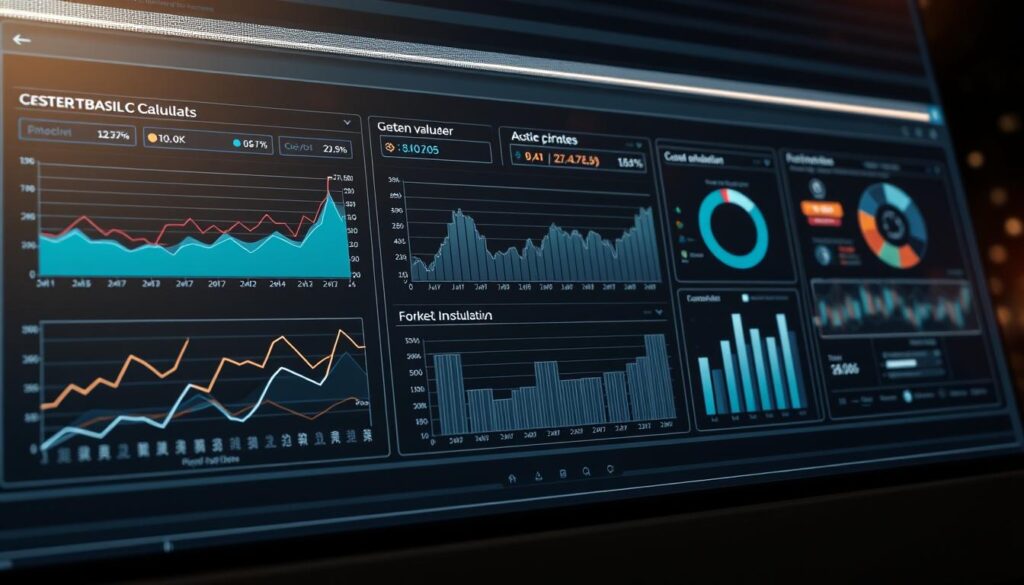Cryptocurrency forks create new digital assets from existing blockchains. But, their tax treatment is still unclear. The IRS and tax laws say holders must report forked coins as taxable income or property. It’s important to understand this to avoid penalties.
Managing cryptocurrency tax for forked coins means tracking new assets and calculating gains. You also need to follow reporting rules. This guide will help you understand how U.S. tax laws apply to fork events, airdrops, and hard forks. You’ll learn how to handle taxable events the right way.
Key Takeaways
- Forked coins may trigger taxable events under IRS guidelines.
- Failure to report forked assets can lead to audits and penalties.
- Accurate records are required for cost basis calculations and fair market valuations.
- IRS Revenue Ruling 2019-24 defines key rules for crypto tax reporting.
- State and international tax rules add complexity to forked asset compliance.
Understanding Cryptocurrency Forks: The Basics
Cryptocurrency forks are key moments in blockchain tech that change digital asset landscapes. They happen when a blockchain splits into two paths, creating new coins or changing rules. tax implications of hard forks and regulatory issues.
What Is a Cryptocurrency Fork?
A fork occurs when developers change a blockchain’s rules, splitting it into two paths. Users might get new coins if they had the original asset at a certain block height. These splits usually come from debates over updates or scalability.
Soft Forks vs. Hard Forks: Key Differences
- Soft Forks: These are updates that keep the network together. They rarely create new coins, so most users don’t face cryptocurrency tax implications.
- Hard Forks: These are big splits that make new blockchains. Holders might get free coins, but this can lead to taxable events under IRS rules.
Notable Cryptocurrency Forks in History
Bitcoin Cash (2017) and Ethereum Classic (2016) came from big hard forks. Bitcoin Gold (2017) and Litecoin Cash (2018) show how tech disputes can lead to new assets. These have real-world financial and tax effects.
How Cryptocurrency Forks Generate Taxable Events
Cryptocurrency forks can lead to taxable events in cryptocurrency forks, making users report income. The tax consequences of cryptocurrency forks vary based on when and how assets are obtained. For instance, Bitcoin holders in 2017 got Bitcoin Cash, creating a tax duty based on the new coins’ value.
IRS rules say forked coins are taxable income when they become available. Even if you don’t do anything, getting new assets counts as income. You must report the fair market value at the fork date, even if you don’t use the coins.
- Receipt of New Coins: Equal to taxable income in the year of the fork
- Sale or Trade: Later transactions generate capital gains/losses
- Failure to Report: Risks penalties for unreported income
Many people make the mistake of waiting to report until they sell. The IRS sees the fork event itself as a taxable moment, not just the sale. Keeping track of fork dates and values helps follow tax laws. Knowing these rules helps avoid issues over unreported income or wrong valuations.
IRS Guidelines on Cryptocurrency Forks
The IRS has set clear IRS guidelines on crypto forks to help with tax rules for digital assets. These rules make sure people follow virtual currency tax rules and report fork gains as income. It’s important to keep good records to avoid fines.
IRS Revenue Ruling 2019-24 Explained
IRS Revenue Ruling 2019-24 says getting new coins from a hard fork is taxable income if you have dominion and control over them. For example, if you had Bitcoin in 2017 when Bitcoin Cash forked, you had to report the new coins as income. This ruling makes it clear forks are not free from taxes. IRS guidelines on crypto forks now say you must figure out the fair market value at the time you get them.
Evolution of IRS Positions on Virtual Currency
Since 2014, the IRS has updated virtual currency tax rules to keep up with digital assets. At first, crypto was seen as property, needing capital gains tracking. Now, updates cover things like airdrops and hard forks, showing how tech and rules have changed.
Current Reporting Requirements for Forked Assets
Filers need to report forked assets using IRS forms like Form 8949 and Schedule D. You must include:
- Date of fork and acquisition cost basis
- Fair market value at receipt
- Transaction gains or losses
For instance, getting forked tokens means filling out Form 8949.Tax experts suggest keeping records of all transactions to meet IRS standards.
Forked Coins Tax Treatment: Current Legal Framework
Understanding forked coins tax treatment involves three key areas: income rules, valuation, and cost basis. These rules help follow IRS guidelines and tackle crypto tax complexities.
Income Recognition Principles for Forked Coins
Taxpayers must report income when they get constructive receipt of forked assets. IRS Revenue Ruling 2019-24 states income comes when the taxpayer controls the new asset. For example, Bitcoin holders getting Bitcoin Cash after a hard fork must report its value as income on the fork date.
Fair Market Value Determination
Valuing forked crypto assets needs solid data. The IRS says to use the price on active exchanges at fork time. If no market exists, taxpayers can use third-party services or appraisals. They must document these valuations for audits.
Cost Basis Calculation Methods
- Zero-Basis Method: Used for forked coins seen as new income. Basis is zero, and gains/losses are from sale proceeds.
- Allocation Method: Splits basis between original and forked assets based on market values. Requires tracking transaction dates and values precisely.
Each method has its own reporting needs. Taxpayers should pick methods that fit IRS rules and their transactions.
Hard Forks vs. Airdrops: Different Tax Implications
Cryptocurrency users often get confused between hard forks and airdrops. But, they have different tax rules. The tax implications of hard forks depend on if new coins are sold. A hard fork splits a blockchain into two, possibly creating new assets.
If users get these coins, they must track when they got them and their value. This is for capital gains calculations.
Airdropped coins are given out by projects to existing wallet addresses. They don’t come from blockchain splits. IRS rules say these tokens are taxable income when received.
For example, Bitcoin Diamond’s 2017 airdrop made recipients report the tokens’ value at the time as income.
- Hard Forks: Taxed when sold, using cost basis from fork date
- Airdrops: Taxed as income when received, valued at fair market value
IRS Revenue Ruling 2019-24 explains that tax treatment of airdropped coins depends on constructive receipt. Users need to keep records of fork and airdrop dates to avoid penalties. Getting these events wrong can lead to audits.
Knowing the difference helps follow IRS rules and avoid mistakes in reporting taxable events.
Determining the Cost Basis of Forked Cryptocurrencies

Figuring out the cost basis for forked crypto assets is crucial for crypto assets taxation. New forked coins often don’t have market data right away. This makes it hard to find their fair market value, which is key for capital gains on digital currencies.
Taxpayers need to focus on three main things: how much something is worth, keeping records, and exchange rates.
Valuation Challenges for New Forked Assets
Early forked coins have big crypto assets taxation challenges. These include:
- Low liquidity causing price swings
- No current prices from big exchanges
- Delayed listings causing value issues
Documentation Requirements for Establishing Cost Basis
IRS rules require detailed records. You need to keep:
- Blockchain transaction timestamps
- Exchange trade confirmations
- Blockchain explorer screenshots
Not keeping these records can lead to audit problems. Tools like CoinLedger help keep records right.
Exchange Rate Considerations
When figuring out gains, use exchange rates from places like Binance or Coinbase at the fork time. You need to pick the most active market. Also, make sure the time zone matches the fork event timing, as per fork event timing.
Getting these details right is important for IRS Revenue Ruling 2019-24. Ignoring exchange rate differences can lead to wrong capital gains during audits.
Reporting Forked Coins on Your Tax Return
When you report forked coins on your tax return, you need to pay close attention to cryptocurrency tax implications and follow virtual currency tax rules. The IRS wants you to document fork events accurately to avoid penalties.
IRS forms like Form 8949 help track transactions, Schedule D summarizes gains and losses, and Schedule 1 reports additional income. Each form has a specific role in recording taxable events related to forked assets.
- First, figure out the tax year when you got forked coins. Income from forks is taxed as ordinary income in the year you receive it.
- On Form 8949, list forked coins as new assets with their fair market value at the time you got them.
- When you sell forked coins, report gains or losses on Schedule D. Use the cost basis you established when you received them.
Make sure to answer “Yes” to the Form 1040 question about virtual currency activity. Not doing so could lead to an audit.
- Hard Fork Example: If you get Bitcoin Cash from a Bitcoin hard fork, report its fair market value on the fork date as ordinary income on Form 8949.
- Airdrop Scenario: Forked coins from airdrops must also be reported similarly. This ensures you track cost basis correctly for future sales.
For complex fork events, you might need extra schedules beyond basic forms. Proper reporting under virtual currency tax rules helps avoid audits.
Common Tax Filing Mistakes with Forked Assets
Missteps in reporting forked coins often lead to costly tax issues. The tax consequences of cryptocurrency forks demand precise handling to avoid penalties. Ignoring these rules risks audits or fines.
- Unreported Income: Failing to declare forked coins as taxable income triggers IRS scrutiny. For example, receiving new coins post-fork without reporting them violates Forked coins tax treatment guidelines. Penalties include 20% accuracy-related fees plus back taxes.
- Flawed Valuations: Using incorrect exchange rates or outdated valuations breaches IRS fair market value rules. Taxpayers must document sources like CoinMarketCap to avoid discrepancies.
- Timing Errors: Mismatching fork dates with tax years causes inaccuracies. Income from 2023 forks reported in 2022 filings could lead to adjustments or audits.
Amended returns (Form 1040-X) can correct past errors, but proactive record-keeping prevents issues. Track fork dates, valuations, and income recognition to align with IRS standards. Proper tax consequences of cryptocurrency forks compliance requires meticulous documentation of every fork event and its tax implications.
Tax-Loss Harvesting Strategies for Forked Coins
Managing taxes for forked crypto assets needs careful planning. Investors can cut capital gains on digital currencies by selling depreciated coins at the right time. This strategy follows IRS rules and uses crypto assets taxation to the fullest.
Timing Considerations for Tax Optimization
Choosing the best time to sell is crucial. Selling coins held for less than a year incurs short-term taxes. But, holding them over a year can lead to lower long-term taxes. Selling at year-end can also reduce taxable income from other sources.
- Track fork event dates to determine cost basis accurately
- Use price swings to trigger losses before December 31
- Avoid premature sales that reset holding periods

Wash sale rules, which prevent buying the same security too soon after selling, don’t clearly apply to crypto. This creates confusion. Here are some tips:
- Wait 31 days before repurchasing forked assets
- Avoid similar digital assets during the cooling period
- Document all transactions for audit readiness
Keeping detailed records of trades, prices, and fork events is key. New tax laws might change these rules, so staying updated is important for planning ahead.
State Tax Considerations for Cryptocurrency Forks
Federal rules are the base for tax consequences of cryptocurrency forks. But, state tax policies add more complexity. In places like California and New York, there are strict rules for reporting. These states push hard for following cryptocurrency tax rules.
On the other hand, states like Wyoming or South Dakota are more lenient. They don’t tax virtual assets at the state level.
- Residency matters: States tax cryptocurrency forks based on where you live at the time of the fork. If you move during the tax year, it can lead to disputes over who gets to tax you.
- Reporting requirements vary: Some states want you to file separately for forked assets, even if federal forms cover them. Make sure to check if your state needs extra paperwork.
- Enforcement priorities differ: States with higher taxes tend to check cryptocurrency transactions more often. For example, New York’s BitLicense rules require detailed records for forked assets.
If your state doesn’t have clear crypto tax rules, you must follow federal guidelines. But, not knowing the rules can increase your tax risk. Always check local guidelines to avoid fines, especially if you’re audited. Keep track of fork events by your state residency dates to meet changing tax rules.
International Tax Implications of Holding Forked Assets
Dealing with virtual currency tax rules gets tricky when assets are forked and cross borders. U.S. taxpayers with crypto on foreign exchanges or those with U.S. ties face complex reporting. This section explains the global tax obligations related to tax implications of hard forks.
U.S. taxpayers with crypto worth over $10,000 on foreign accounts must file FinCEN Form 114 (FBAR). Those with ties to foreign finances also report under FATCA. Forked assets in non-U.S. wallets might need these filings, even without taxable income. For example, a Bitcoin holder keeping Bitcoin Cash after a hard fork on a Singapore exchange must report the account yearly.
- FBAR applies to aggregate foreign crypto holdings over $10,000
- FATCA requires IRS Form 8938 for non-U.S. crypto holdings exceeding $50,000
Tax Treaties & Double Taxation Risks
Countries like Japan, Germany, and Canada have their own virtual currency tax rules for forked assets. Tax treaties can help avoid double taxation. For example, U.S.-UK tax treaties allow credits for foreign taxes on fork gains, lowering total tax.
Strategies to Avoid Double Taxation
Keep track of all places where forked assets are held. Keep detailed records of foreign tax payments to claim credits on U.S. returns. Plan sales or forks to match treaty rules. Check treaty details for asset and residency rules.
Expatriates and global investors must match reports across all countries involved. Failing to do so can lead to penalties under both domestic and foreign laws.
Professional Help: When to Consult a Crypto Tax Specialist
Handling taxable events in cryptocurrency forks can be tricky. If you’re dealing with complex tax issues, it might be wise to get help from a crypto tax expert. Here are some situations where you might need one:
- Larger forks exceeding $10,000 in value, creating high-stakes capital gains calculations.
- Assets held across multiple countries, requiring compliance with international tax treaties.
- Business ownership involving forked coins, needing separate accounting from personal holdings.
- Unreported taxable events requiring remediation under IRS guidelines.

Look for a specialist with the right credentials. They should have a CPA or Enrolled Agent (EA) status and experience with IRS crypto audits. Ask them about:
- Prior cases involving fork-specific filings.
- Knowledge of IRS Revenue Ruling 2019-24 and recent updates.
- Fee transparency for fork-related services.
Think about the costs versus the risks. If your portfolio is over $500,000, professional fees might be worth it to avoid penalties. Smaller investors can handle basic tasks but might need experts for specific fork-related advice.
Working together is usually the best approach. Manage simple tasks yourself but get experts for complex asset valuations or fixing past mistakes. Choosing clarity over DIY can save you from costly errors in reporting taxable events in cryptocurrency forks.
Record-Keeping Best Practices for Cryptocurrency Forks
IRS rules for crypto forks require detailed records to follow tax laws. Keeping accurate records helps in reporting and lowers audit risks. Here’s how to keep your data in order:
- Track blockchain timestamps of fork events to verify asset creation dates.
- Save wallet snapshots pre- and post-fork showing balances and transaction IDs.
- Archive exchange announcements or emails confirming fork eligibility and distribution dates.
- Log trading activity during fork periods, including earliest available price data for fair market value calculations.
Use tools like CoinTracking or Koinly to log fork events automatically. These tools follow IRS guidelines in their reports. Keep both digital and physical copies of records for 3-7 years, as the IRS suggests.
Remember the difference between when you can access forked coins and when you actually withdraw them. This matters for when you report taxes under IRS rules. For instance, the 2022 Bitcoin Cash fork needs proof of when you first had access, even if you didn’t use the coins.
Good records help avoid arguments over how much you paid for coins. During audits, detailed records of fork events and values can support your claims of gains or losses. Use crypto tax software designed for audits, not generic spreadsheets.
Navigating the Future of Forked Coin Taxation as Regulations Evolve
Changes in cryptocurrency taxation are coming. New laws might change how we tax airdropped coins and virtual currencies. It’s crucial for taxpayers to keep up with these changes.
Proposed laws could make it clearer how to report new assets from forks or airdrops. This could affect how we track and report forked or airdropped coins.
The IRS is getting stricter, with new rules and more audits. This means exchanges and taxpayers might face new reporting needs. Keeping up with these changes is key to avoiding trouble.
There are two main ways to handle airdropped coins: being cautious or proactive. The cautious approach treats them as taxable right away. The proactive method waits for clearer rules.
Both methods need careful record-keeping to match the changing tax rules. It’s important to stay updated on these changes.
To stay ahead, watch IRS updates and follow congressional talks on digital assets. Also, talk to tax experts who know about virtual currencies. This way, you can make sure you’re following the latest tax rules.
FAQ
What is the tax treatment of forked coins according to IRS guidelines?
IRS guidelines say you must report forked coins as income. This is based on Revenue Ruling 2019-24. If you get new coins from a hard fork, you report their value as income.
Are hard forks treated differently than airdrops for tax purposes?
Yes, they are treated differently. Hard forks create new assets through splits, which are taxable. Airdrops, on the other hand, are distributions of tokens. They might be taxable income, but with different reporting rules.
What are the taxable events associated with cryptocurrency forks?
Taxable events happen when you get new coins or sell old ones. If the new coins are income, report their value. Selling them later can lead to capital gains or losses.
How should I determine the cost basis for forked cryptocurrencies?
Finding the cost basis for forked coins is tricky. You might use the zero-basis or allocation method. Keep records of fair market value and transactions to support your tax filings.
What documentation do I need to keep for forked cryptocurrencies?
Keep records of transactions, fork event timestamps, wallet snapshots, and fork announcements. Having these for 3-7 years helps with tax filings and audits.
Are there specific IRS forms I need to use when reporting forked coins?
Yes, you’ll need Form 8949 for capital gains and losses. Also, Schedule D and possibly Schedule 1. Make sure to answer the virtual currency question on Form 1040 correctly.
How can I avoid common tax filing mistakes with forked assets?
Report all forked asset income accurately. Use recognized valuation methods and report on time. Review IRS guidelines and seek help when needed to avoid penalties or audits.
What is the impact of state taxes on cryptocurrency forks?
State taxes on cryptocurrency forks vary. Some states follow federal rules, while others have their own rules. Know your state’s tax laws and how they affect forked assets.
When should I consider consulting a crypto tax specialist?
Seek a crypto tax specialist for complex situations. This includes large-value forks, international issues, business ownership, or past non-compliance. They offer valuable advice for complex cases.
What are the international tax implications for holding forked assets?
Holding forked assets can lead to international tax obligations. This includes FBAR and FATCA reporting. Understand tax treaties to avoid double taxation. Keep proper documentation for compliance.


No comments yet